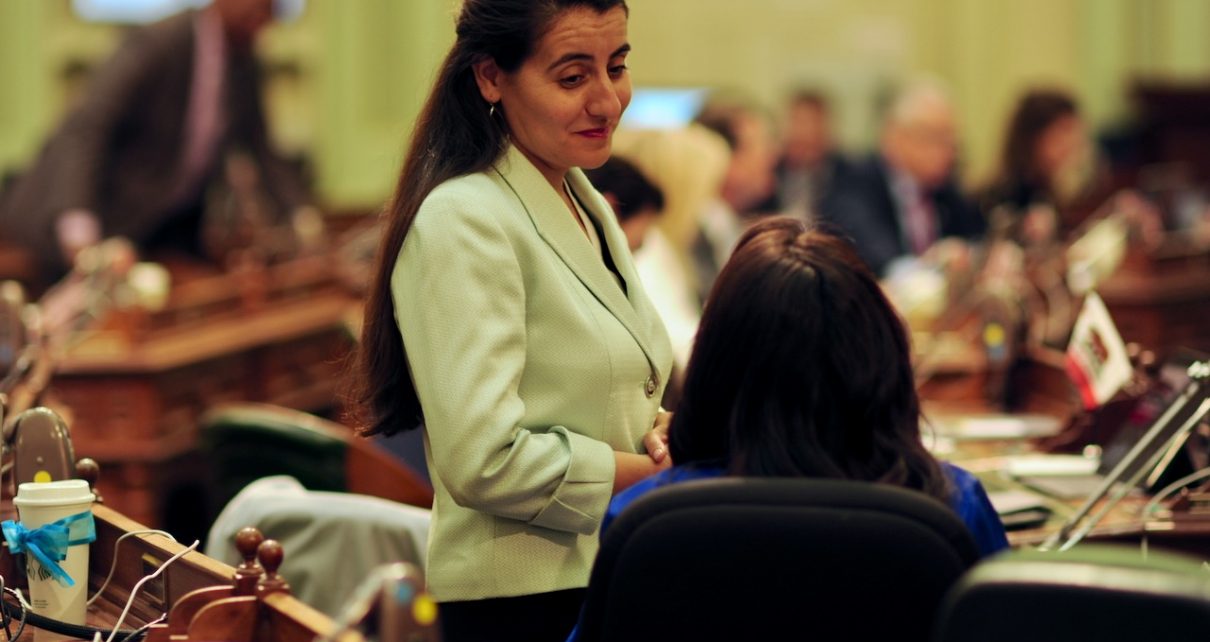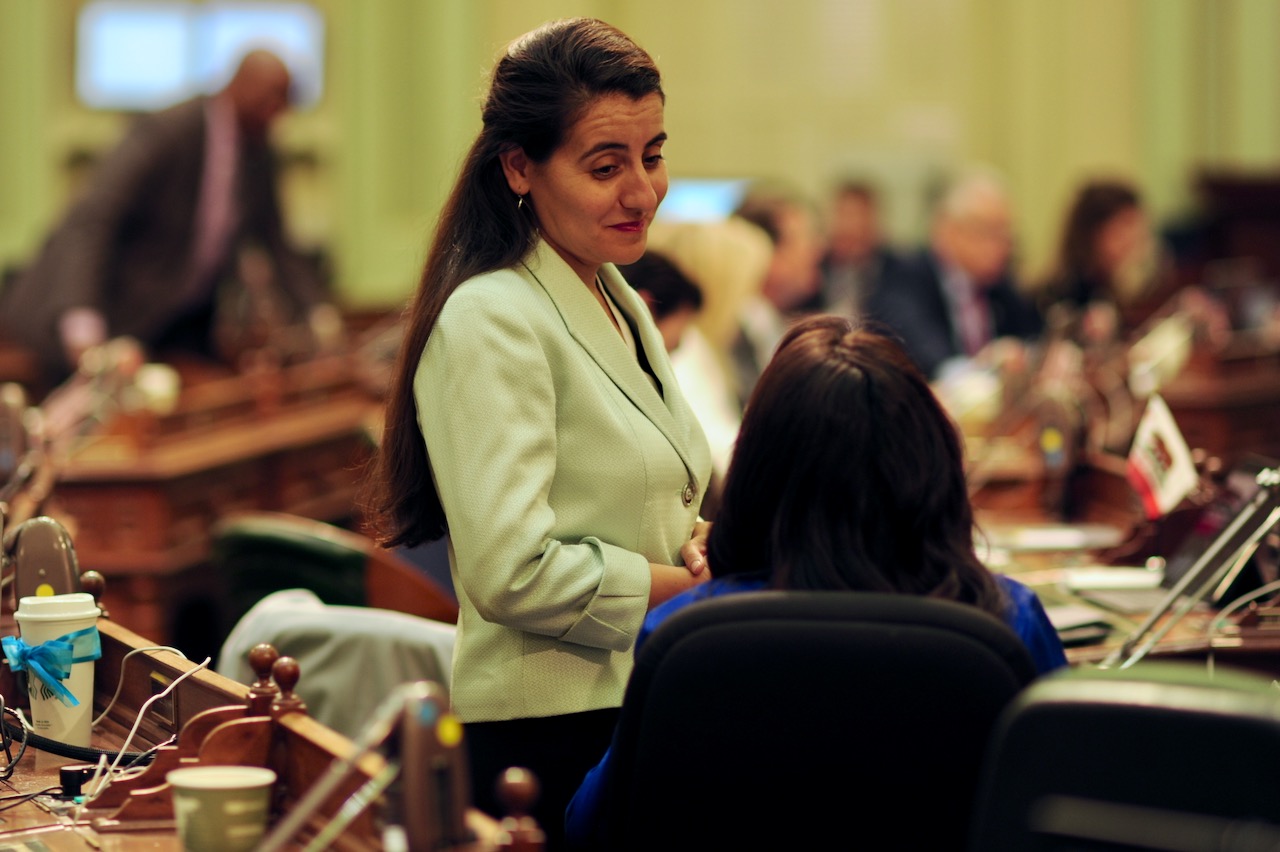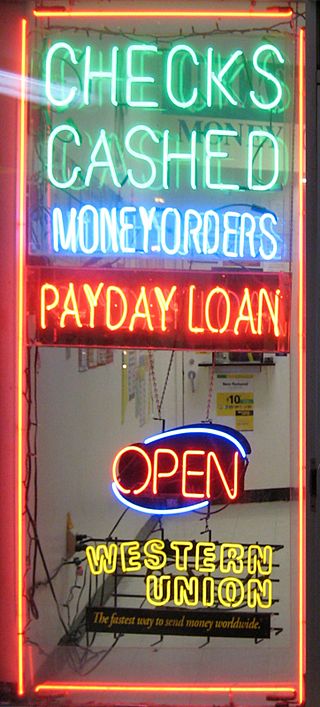
Senator Monique Limón. (Kevin Sanders for California Globe)
Bill to Limit ‘Predatory Lending’ Excludes Three Lenders Who Stand to Benefit From Legislation
AB 539: Protecting the consumer or benefitting politicians and campaign contributors?
By Katy Grimes, October 5, 2019 4:55 pm

A bill to bar “predatory lenders,” like payday small loan companies, from imposing excessively high-interest rates on people who borrow $2,500 up to $10,000, is sitting on Governor Gavin Newsom’s desk awaiting his signature or his veto.
“Assembly Bill 539 by Assemblywoman Monique Limón (D-Santa Barbara) establishes an interest rate cap of 36 percent plus the federal funds rate for California Financing Law (CFL) licensee-provided consumer loans with principal amounts between $2,500 and $10,000,” California Globe reported in June. This bill also prohibits a CFL licensee from charging a penalty for prepayment of a consumer loan and establishes minimum loan terms.
But what about people who need an emergency loan and can’t get it from a bank? They know the non-bank lender charges a high rate of interest, but are willing to pay because of the emergency need.
However, while AB 539 may sound as if it is a good government bill attempting to limit the interest rates on these types of loans to 36 percent, three lenders, OneMain, Oportun, and Lendmark, listed as supporters of AB 539, also appear to be exempted from the bill merely because they already cap their interest at 36 percent.
But these lenders understate their APRs through aggressive selling of add-on products, according to a recent Pew study. These add-on products are considered predatory because borrowers are unaware of how they impact the actual cost of the loan – a technicality left out of this bill.
In an interesting sidebar, Limón’s bill also appears to benefit Democratic Presidential candidate and billionaire hedge fund manager Tom Steyer, and the wealthy Walton family, which owns Walmart.
AB 539 will make Steyer and the Waltons more wealthy, and create a government-legislated monopoly for some obvious predatory lenders, who appear to have guaranteed that outcome through campaign contributions.
Tom Steyer provided the seed capital to Oportun, which will benefit from the law being passed since it will allow them to continue operating but eliminate a significant amount of Oportun’s competition.
Also invested is Madrone Capital Partners, managed by Gregory Penner, who is married to a member of the Walton family. Penner manages Madrone Capital Partners, which manages the wealth of the Waltons.
Sometimes the most virtuous-appearing consumer protection bills are not at all. This is classic politics in the State Capitol.
What did Pew Research Find?
“Pew’s research indicates that when states set rate limits under which consumer finance companies cannot make loans profitably, lenders sell credit insurance to earn revenue that they are not permitted to generate through interest or fees. In one fiscal year, five of the largest national installment lenders reported combined revenue of more than $450 million from ancillary products.”
“If real market forces were at work, it would be natural for a 36% loan product to beat a 100% loan product in a free market, so why is a regulation necessary?” former State Senator Ray Haynes wrote in an op ed. “One would expect market forces to resolve the problem without AB 539. As important, if a business could make a profit with a 36% loan, why wouldn’t all the businesses in that market reduce their interest to compete?”
“The three lenders who offer these lower interest rates are not entirely honest with the borrowers,” Haynes, an attorney, said. “They engage in a practice known as ‘loan packing,’ that is, they use undisclosed or deceptive practices to increase their profits by adding on ‘products’ that are of little value to the customer, but create large amounts of revenue to the lender, that more than make up for the lost interest.”
Haynes also reported that 80 percent of Assemblywoman Limón’s campaign contributions this year have originated from these dubious lenders. “She then introduces a bill that benefits these companies, sells it as a pro-consumer bill (which the NCLC says is anything but), and the consumer gets the shaft, while Democrats pretend to be the consumers’ friends.”
“Assemblywoman Limón, chair of the policy committee that heard and passed the bill, said nothing about the contributions, said nothing about the sharp practices by the businesses from which she received contributions with a bill specifically designed to help these businesses, and then she advances the ‘pay to play’ agenda of the Sacramento Democrats.”
Also opposed to AB 539, the California Hispanic Chamber of Commerce wrote: CHCC” represents the interests of more than 800,000 Hispanic business owners in California. We are deeply concerned about the impact AB 539 will have on small businesses and consumers. As proposed, AB 539 will limit lenders’ ability to provide a variety of short-term credit options to borrowers in need.”
- Could President Trump End the Income Tax? - February 26, 2026
- Trump State of the Union: Democrats Showed They’re Not On the Side of The American People - February 25, 2026
- Leaving California: Public Storage Relocates HQ from California to Texas - February 25, 2026





Could you explain how these three lenders “appear to be exempted from the bill”? I work in the industry and failed to verify this.
The mandatory add on fees and ancillary products are not calculated in the APR.
The author should just take out the word “appear”. They are exempt, which is why they backed up the truck on contributions. Also exempt will be lenders that affiliate with Indian Tribes to evade state law. This bill will reduce the supply of credit and increase the cost of borrowing for California families. It is old-school politics and Governor Newsom would be wise veto the measure and ask the Assembly to start over on a more comprehensive approach.
“Appear” to be exempted is used because they are not specifically named as exempted in the bill language.
Got it, thank you Katy and Edward. Sounds like the point is the final legislation does not ban loan packing, which is key to these lenders’ model. I misunderstood, thinking these three lenders got a special pass on compliance. I figure other state-licensed non-bank lenders can copy these practices to stay in the state.
Thank you for following up.
This bill is so misleading and will hurt people and it’s really shady that Liomon gets 80% of her donations from these lenders.